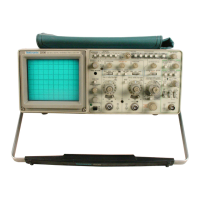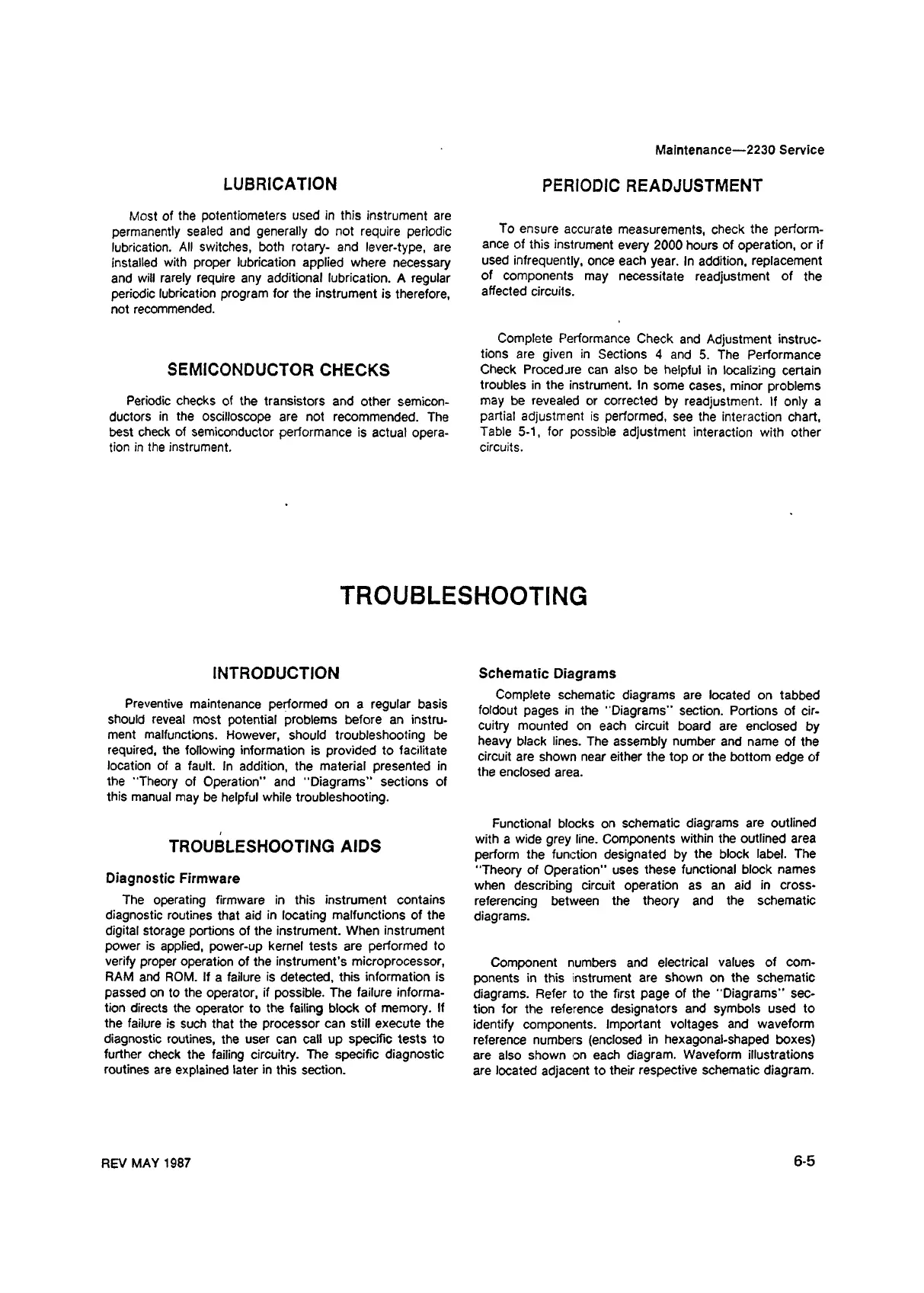Maintenance—2230 Service
LUBRICATION
Most of the potentiometers used in this instrument are
permanently seated and generally do not require periodic
lubrication. All switches, both rotary- and lever-type, are
installed with proper lubrication applied where necessary
and will rarely require any additional lubrication. A regular
periodic lubrication program for the instrument is therefore,
not recommended.
SEMICONDUCTOR CHECKS
Periodic checks of the transistors and other semicon
ductors in the oscilloscope are not recommended. The
best check of semiconductor performance is actual opera
tion in the instrument.
PERIODIC READJUSTMENT
To ensure accurate measurements, check the perform
ance of this instrument every 2000 hours of operation, or if
used infrequently, once each year. In addition, replacement
of components may necessitate readjustment of the
affected circuits.
Complete Performance Check and Adjustment instruc
tions are given in Sections 4 and 5. The Performance
Check Procedure can also be helpful in localizing certain
troubles in the instrument. In some cases, minor problems
may be revealed or corrected by readjustment. If only a
partial adjustment is performed, see the interaction chart,
Table 5-1, for possible adjustment interaction with other
circuits.
TROUBLESHOOTING
INTRODUCTION
Preventive maintenance performed on a regular basis
should reveal most potential problems before an instru
ment malfunctions. However, should troubleshooting be
required, the following information is provided to facilitate
location of a fault. In addition, the material presented in
the "Theory of Operation” and "Diagrams” sections of
this manual may be helpful while troubleshooting.
TROUBLESHOOTING AIDS
Diagnostic Firmware
The operating firmware in this instrument contains
diagnostic routines that aid in locating malfunctions of the
digital storage portions of the instrument. When instrument
power is applied, power-up kernel tests are performed to
verify proper operation of the instrument’s microprocessor,
RAM and ROM. If a failure is detected, this information is
passed on to the operator, if possible. The failure informa
tion directs the operator to the failing block of memory. If
the failure is such that the processor can still execute the
diagnostic routines, the user can call up specific tests to
further check the failing circuitry. The specific diagnostic
routines are explained later in this section.
Schematic Diagrams
Complete schematic diagrams are located on tabbed
foldout pages in the "Diagrams” section. Portions of cir
cuitry mounted on each circuit board are enclosed by
heavy black lines. The assembly number and name of the
circuit are shown near either the top or the bottom edge of
the enclosed area.
Functional blocks on schematic diagrams are outlined
with a wide grey line. Components within the outlined area
perform the function designated by the block label. The
"Theory of Operation” uses these functional block names
when describing circuit operation as an aid in cross-
referencing between the theory and the schematic
diagrams.
Component numbers and electrical values of com
ponents in this instrument are shown on the schematic
diagrams. Refer to the first page of the "Diagrams” sec
tion for the reference designators and symbols used to
identify components. Important voltages and waveform
reference numbers (enclosed in hexagonal-shaped boxes)
are also shown on each diagram. Waveform illustrations
are located adjacent to their respective schematic diagram.
REV MAY 1987
6-5

